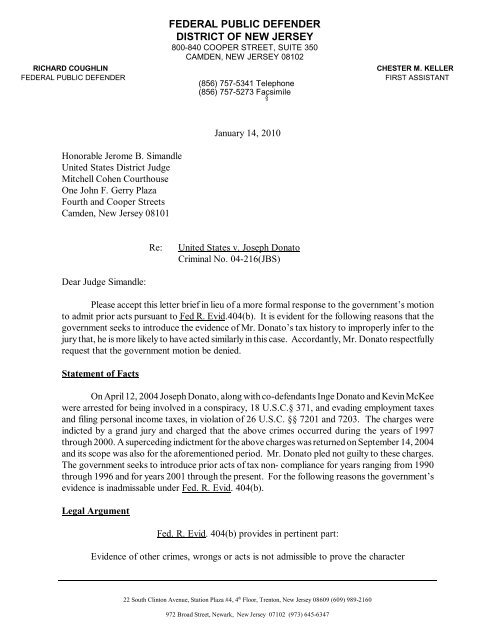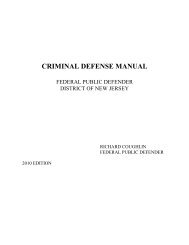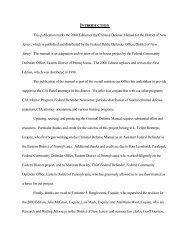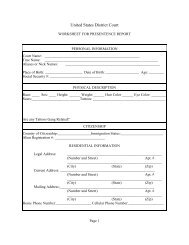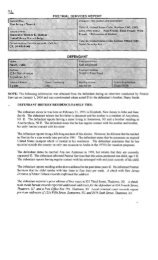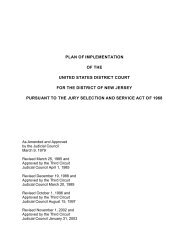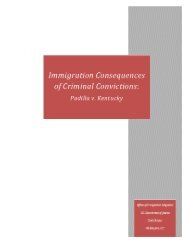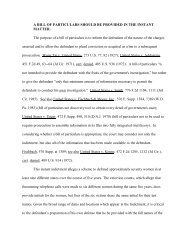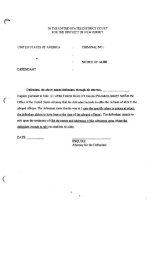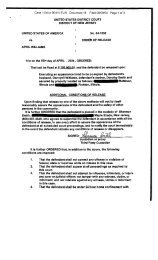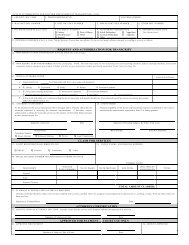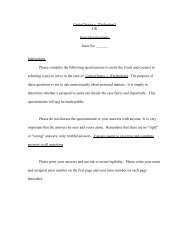Sample Motion Pursuant to Fed. R. Evid. 404(b) - Federal Public ...
Sample Motion Pursuant to Fed. R. Evid. 404(b) - Federal Public ...
Sample Motion Pursuant to Fed. R. Evid. 404(b) - Federal Public ...
Create successful ePaper yourself
Turn your PDF publications into a flip-book with our unique Google optimized e-Paper software.
FEDERAL PUBLIC DEFENDER<br />
DISTRICT OF NEW JERSEY<br />
800-840 COOPER STREET, SUITE 350<br />
CAMDEN, NEW JERSEY 08102<br />
RICHARD COUGHLIN CHESTER M. KELLER<br />
FEDERAL PUBLIC DEFENDER FIRST ASSISTANT<br />
(856) 757-5341 Telephone<br />
(856) 757-5273 Facsimile<br />
§<br />
Honorable Jerome B. Simandle<br />
United States District Judge<br />
Mitchell Cohen Courthouse<br />
One John F. Gerry Plaza<br />
Fourth and Cooper Streets<br />
Camden, New Jersey 08101<br />
Dear Judge Simandle:<br />
January 14, 2010<br />
Re: United States v. Joseph Dona<strong>to</strong><br />
Criminal No. 04-216(JBS)<br />
Please accept this letter brief in lieu of a more formal response <strong>to</strong> the government’s motion<br />
<strong>to</strong> admit prior acts pursuant <strong>to</strong> <strong>Fed</strong> R. <strong>Evid</strong>.<strong>404</strong>(b). It is evident for the following reasons that the<br />
government seeks <strong>to</strong> introduce the evidence of Mr. Dona<strong>to</strong>’s tax his<strong>to</strong>ry <strong>to</strong> improperly infer <strong>to</strong> the<br />
jury that, he is more likely <strong>to</strong> have acted similarly in this case. Accordantly, Mr. Dona<strong>to</strong> respectfully<br />
request that the government motion be denied.<br />
Statement of Facts<br />
On April 12, 2004 Joseph Dona<strong>to</strong>, along with co-defendants Inge Dona<strong>to</strong> and Kevin McKee<br />
were arrested for being involved in a conspiracy, 18 U.S.C.§ 371, and evading employment taxes<br />
and filing personal income taxes, in violation of 26 U.S.C. §§ 7201 and 7203. The charges were<br />
indicted by a grand jury and charged that the above crimes occurred during the years of 1997<br />
through 2000. A superceding indictment for the above charges was returned on September 14, 2004<br />
and its scope was also for the aforementioned period. Mr. Dona<strong>to</strong> pled not guilty <strong>to</strong> these charges.<br />
The government seeks <strong>to</strong> introduce prior acts of tax non- compliance for years ranging from 1990<br />
through 1996 and for years 2001 through the present. For the following reasons the government’s<br />
evidence is inadmissable under <strong>Fed</strong>. R. <strong>Evid</strong>. <strong>404</strong>(b).<br />
Legal Argument<br />
<strong>Fed</strong>. R. <strong>Evid</strong>. <strong>404</strong>(b) provides in pertinent part:<br />
<strong>Evid</strong>ence of other crimes, wrongs or acts is not admissible <strong>to</strong> prove the character<br />
22 South Clin<strong>to</strong>n Avenue, Station Plaza #4, 4 th Floor, Tren<strong>to</strong>n, New Jersey 08609 (609) 989-2160<br />
972 Broad Street, Newark, New Jersey 07102 (973) 645-6347
of a person in order <strong>to</strong> show action in conformity therewith. It may, however, be<br />
admissible for other purposes, such as proof of motive, opportunity, intent,<br />
preparation, plan, knowledge, identity, or absence of mistake or accident.<br />
In order <strong>to</strong> admit prior bad act evidence, the court must be satisfied that the following four<br />
criteria are met:<br />
(1) the evidence must have a proper purpose under Rule <strong>404</strong>(b); (2) it must be<br />
relevant under Rule 402; (3) its probative value must outweigh its prejudicial effect<br />
under Rule 403; and (4) the court must charge the jury <strong>to</strong> consider the evidence only<br />
for the limited purpose for which it is admitted.<br />
United States v. Console, 13 F.3d 641, 659 (3rd Cir. 1993) cert. denied, 511 U.S. 1076, and 513 U.S.<br />
812 (1994)(citing United States v. Sampson, 980 F.2d 883, 886 (3rd Cir. 1992).<br />
Although sometimes characterized as a "rule of admissibility," the Third Circuit has repeatedly<br />
expressed its concern that "although the government will hardly admit it, the reasons proffered <strong>to</strong><br />
admit prior bad act evidence may often be Potemkin village, because the motive, we suspect, is often<br />
mixed between an urge <strong>to</strong> show some other consequential fact as well as <strong>to</strong> impugn the defendant’s<br />
character." United States v. Jemal, 26 F.3d 1267, 1272 (3rd Cir. 1994)(quoting, Sampson, supra, at<br />
886). Accordingly, when the government "offers prior offense evidence, it must clearly articulate<br />
how that evidence fits in<strong>to</strong> a chain of logical inferences, no link of which can be the inference that<br />
because the defendant committed . . . offenses before, he therefore is more likely <strong>to</strong> have committed<br />
this one." Id. at 1272 (quoting Sampson at 887).<br />
Finally, as stated earlier, if the prior acts evidence is found <strong>to</strong> be relevant, the court must<br />
weigh its probative value against the danger that it unfairly prejudices the defendant. In this balancing<br />
process, the court must "assess the genuine need for the challenged evidence and balance that against<br />
the risk that the information will influence the jury <strong>to</strong> convict on improper grounds." United States<br />
v. Sriyuth, 98 F.3d 739, 747-48 (3rd Cir. 1996) cert. denied, 117 S. Ct. 1016 (1997). The court must<br />
consider several fac<strong>to</strong>rs in its weighing process, including:<br />
[t]he actual need for that evidence in view of the contested issues and the other<br />
evidence available <strong>to</strong> the prosecution, and the strength of the evidence in proving the<br />
issue, against the danger that the jury will be inflamed by the evidence <strong>to</strong> decide that<br />
because the accused was the perpetra<strong>to</strong>r of the other crimes, he probably committed<br />
the for which he is on trial as well . . . . The treasured principles underlying the rule<br />
against admitting evidence of other crimes should be relaxed only when such evidence<br />
is genuinely needed and would be genuinely relevant.<br />
Id. at 748 (quoting United States v. Cook, 538 F.3d 1000, 1003 (3rd Cir. 1976)). In short, "<strong>to</strong><br />
overcome this significant risk of unfair prejudice, the government must prove necessity." Id.
A. The evidence of the Mr. Dona<strong>to</strong>’s prior tax record is relevant <strong>to</strong> no other issue<br />
in this case except <strong>to</strong> show Mr. Dona<strong>to</strong>’s alleged propensity <strong>to</strong> evade, defeat,<br />
and willfully fail <strong>to</strong> report, and pay tax is inadmissible.<br />
<strong>Pursuant</strong> <strong>to</strong> <strong>Fed</strong>. R. <strong>Evid</strong>. 402, "all relevant evidence is admissible, except as otherwise<br />
provided by . . . these rules." <strong>Fed</strong>. R. <strong>Evid</strong>. 401 defines "relevant evidence" as "evidence having any<br />
tendency <strong>to</strong> make the existence of any fact that is of consequence <strong>to</strong> the determination of the action<br />
more probable or less probable than it would be without the evidence." The government asserts that<br />
the proffered prior failure <strong>to</strong> comply with state and federal tax law is relevant <strong>to</strong> show that<br />
defendant’s motive, intent knowledge and acted without mistake. Moreover the government asserts<br />
that this conduct outside the indictment is needed <strong>to</strong> prove the defendant acted willfully. The<br />
government desire for this evidence is because the defendant did not comply with state and federal<br />
tax law in years before and after the indictment than he is likely <strong>to</strong> have committed the crimes in this<br />
case. This is hardly the type of tight logical fit that is required <strong>to</strong> admit prior bad act evidence.<br />
Jemal at 1272.<br />
As stated above if the prior crime evidence is found <strong>to</strong> be relevant, the court must weigh its<br />
probative value against the danger that it unfairly prejudices the defendant. In this balancing process,<br />
the court must "assess the genuine need for the challenged evidence and balance that against the risk<br />
that the information will influence the jury <strong>to</strong> convict on improper grounds" United States v. Sriyuth<br />
, 98 F.3d 739, 747-48(3rd Cir. 1996) cert. denied 117 S. Ct. 1016 (1997) The court must consider<br />
several fac<strong>to</strong>rs in its weighing process, including:<br />
[t]he actual need for that evidence in view of the contested issues and the other<br />
evidence available <strong>to</strong> the prosecution, and the strength of the evidence in proving the<br />
issue, against the danger that the jury will be inflamed by the evidence <strong>to</strong> decide that<br />
because the accused was the perpetra<strong>to</strong>r of the other crimes, he probably committed<br />
the crime for which he is on trial as well.... The treasured principles underlying the<br />
rule against admitting evidence of other crimes should be relaxed only when such<br />
evidence is genuinely needed and would be genuinely relevant.<br />
Id. at 748 (quoting United States v. Cook, 538 F.2d 1000, 1003 (3rd Cir. 1976) In short, " <strong>to</strong><br />
overcome this significant of unfair prejudice, the government must prove necessity. Id.<br />
The government charges that this evidence is needed <strong>to</strong> additionally prove that the defendant<br />
acted willfully. The government states these documents offer limited detail regarding the defendants<br />
knowledge, intent and lack of mistake. The desire for these additional documents is unnecessary and<br />
redundant, and their true purpose is <strong>to</strong> inflame the jury and unfairly prejudice the defendant from<br />
having a fair trial with the presumption of innocense afforded criminal defendants. Moreover the<br />
inclusion of the state tax records will add confusion and lengthen the case .<br />
"In order <strong>to</strong> admit evidence under the "intent" component of Rule <strong>404</strong>(b), intent must be an<br />
element of the crime charged and the evidence offered must cast light upon the defendant’ s intent<br />
<strong>to</strong> commit the crime." United States v. Himelwright, 42 F.3d 777,782 (3d Cir. 1994) (citing united<br />
States v. Kirk, 528 F.2d 1057, 1060 (5th Cir. 1976). To be admissible under <strong>404</strong>(b) an evidential link
etween the proffered evidence and an issue at trial other than character is essential Huddles<strong>to</strong>n v.<br />
United States, 485 U.S.681, 686 (1988); United States v. Echeverri, 854 F.2d 638,644 (3rd Cir.<br />
1988). See also Government v. Virgin Islands v. Archibald, 987 F.2d 180 (3rd Cir. 1993).<br />
Speculation is not evidence of a connection between two matters. See, United States v. Schwartz,<br />
790 F.2d 1059.<br />
In this case only speculation and guesswork can provide the link between the documents and<br />
testimony sought <strong>to</strong> be introduced by the government and defendant’s intent <strong>to</strong> commit the instant<br />
offense. The documents and testimony relate <strong>to</strong> persons and activity which are not covered in the<br />
indictment. It is not sufficient for the government <strong>to</strong> speculate that these documents or this testimony<br />
has any bearing on the defendant’s intent in this case. Additionally, the documents and testimony is<br />
substantially outweighed by the prejudice <strong>to</strong> the defendant resulting from their use.<br />
B. Assuming, arguendo, that the prior crimes are marginally relevant, its relevance<br />
is substantially outweighed by the risk of unfair prejudice <strong>to</strong> Mr. Dona<strong>to</strong>.<br />
<strong>Fed</strong>. R. <strong>Evid</strong>. 403 states in pertinent part: "although relevant, the evidence may be excluded<br />
if its probable value is substantially outweighed by the danger of unfair prejudice, confusion of issues,<br />
or misleading the jury, or by considerations of undue delay, waste of time, or needless presentation<br />
of cumulative evidence." This is precisely the type of situation in which the proffered evidence tends<br />
<strong>to</strong> focus the jury on the prior acts instead of the instant crime charged. It is a very short hop for the<br />
jury <strong>to</strong> improperly conclude that since the defendant did it before, he probably did it this time. The<br />
past tax non-compliance are the same and the government argues that the manner in which the crimes<br />
were committed are the same. This, coupled with the strength of the government’s case, unfairly<br />
prejudices the defendant in a way that substantially outweighs any marginal relevance the evidence<br />
has <strong>to</strong> the purposes for which the government offers it (specific plan, method and motive). Moreover,<br />
given the clear and strong evidence the government is likely <strong>to</strong> offer concerning the instant offense,<br />
the presentation of the prior crime evidence is simply a "needless presentation of cumulative<br />
evidence."<br />
For the foregoing reasons, Mr. Dona<strong>to</strong> submits that the government’s motion <strong>to</strong> admit<br />
evidence of a prior fraud and perjury pursuant <strong>to</strong> <strong>Fed</strong>. R. <strong>Evid</strong>. <strong>404</strong>(b) should be denied.<br />
cc: Michael Visiliadis, Esq.<br />
Joseph Dona<strong>to</strong><br />
Respectfully Submitted,<br />
s/Chris<strong>to</strong>pher O’Malley<br />
Assistant <strong>Fed</strong>eral <strong>Public</strong> Defender


